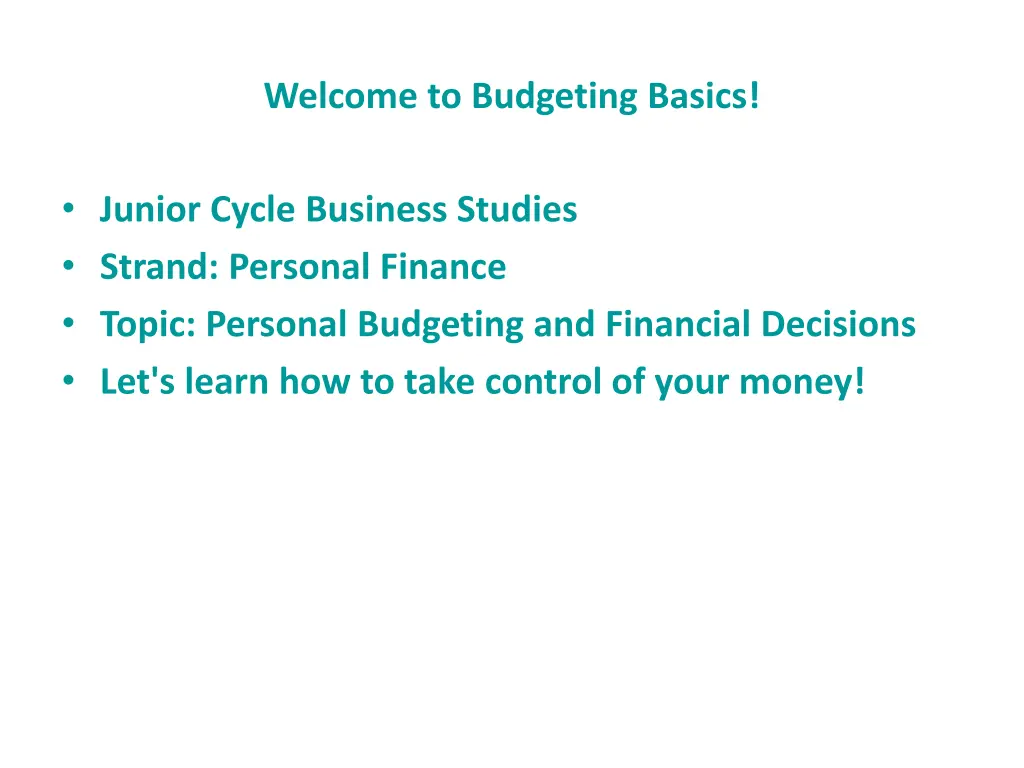
Practical Budgeting Tips for Personal Finance Management
"Learn essential budgeting basics and financial decision-making skills in this interactive guide. Explore needs vs. wants, key terms like income and expenses, and complete a monthly budget challenge. Get advice on handling deficits and visualize your budget effectively. Reflect on financial decisions and track your income and spending for effective budgeting. Start taking control of your money today!"
Download Presentation

Please find below an Image/Link to download the presentation.
The content on the website is provided AS IS for your information and personal use only. It may not be sold, licensed, or shared on other websites without obtaining consent from the author. If you encounter any issues during the download, it is possible that the publisher has removed the file from their server.
You are allowed to download the files provided on this website for personal or commercial use, subject to the condition that they are used lawfully. All files are the property of their respective owners.
The content on the website is provided AS IS for your information and personal use only. It may not be sold, licensed, or shared on other websites without obtaining consent from the author.
E N D
Presentation Transcript
Welcome to Budgeting Basics! Junior Cycle Business Studies Strand: Personal Finance Topic: Personal Budgeting and Financial Decisions Let's learn how to take control of your money!
Interactive Task: Needs vs Wants List 5 NEEDS (must-haves) List 5 WANTS (nice-to-haves) NEEDS WANTS Need 1 Want 1 Need 2 Want 2 Need 3 Want 3 Need 4 Want 4 Need 5 Want 5 Why is this important for budgeting?
Budgeting Basics Key Terms Income: Money you receive (e.g. job, allowance) Fixed Expenses: Regular monthly costs (e.g. rent, subscriptions) Variable Expenses: Fluctuating monthly costs (e.g. groceries, transport) Surplus: Income > Expenses Deficit: Expenses > Income Interactive Task Monthly Budget Challenge Complete a sample budget table Calculate total income & expenses Check for surplus or deficit Discussion Prompt Think-Pair-Share Advice for someone with a deficit? Pair and share your thoughts Present one key idea to the class
Budgeting Basics Income: Money you receive, e.g. from a job or allowance. Fixed Expenses: Costs that stay the same every month, like rent. Variable Expenses: Costs that change monthly, like groceries. Surplus: When income is more than expenses. Deficit: When expenses are more than income.
Interactive Task: Monthly Budget Challenge Complete a sample budget table Calculate total income & expenses Determine if there's a surplus or deficit
Think-Pair-Share What advice would you give to someone with a deficit? Pair up and share ideas Present 1 key idea to the class
Extension Task: Visualise Your Budget Create a bar chart or pie chart Label income vs expenses clearly Present it to the class or submit digitally
Reflection Time What decisions would change your financial outcome? How could you increase income or reduce spending?
Homework Track your income and spending for the week Create your own personal weekly budget Take a photo or bring it in for discussion
Monthly Budget Challenge Example Budget: ------------------------- Income: - Part-time Job: 200 - Allowance: 50 Total Income: 250 Create your own monthly budget Calculate total income and expenses Check for surplus or deficit Be ready to share your financial strategy! Expenses: - Transport: 40 - Food: 60 - Entertainment: 30 - Phone: 20 Total Expenses: 150 Result: Surplus of 100
